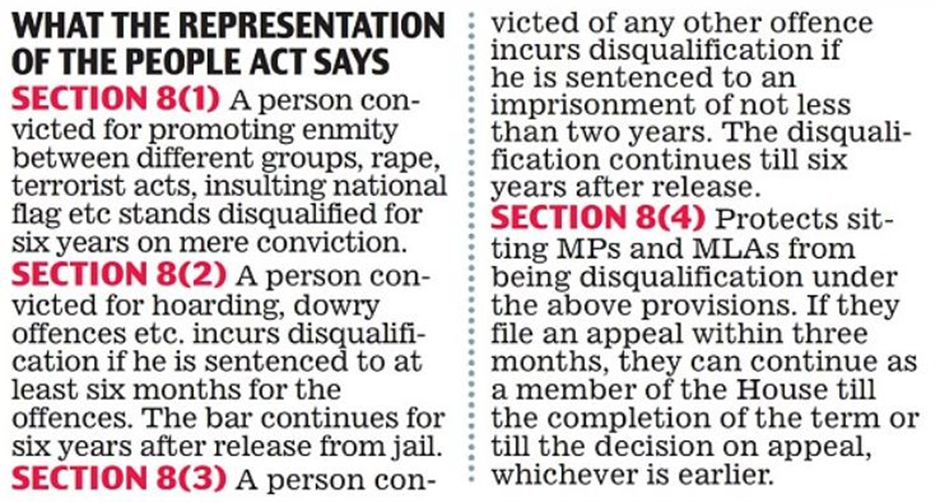Ahmedabad
(Head Office)Address : 506, 3rd EYE THREE (III), Opp. Induben Khakhrawala, Girish Cold Drink Cross Road, CG Road, Navrangpura, Ahmedabad, 380009.
Mobile : 8469231587 / 9586028957
Telephone : 079-40098991
E-mail: dics.upsc@gmail.com

Section 8(4) of RPA and Lily Thomas case
Context – The article provides a case to restore the Section 8(4) of RPA.
Background
• The recent disqualification of Rahul Gandhi, based on his conviction and imprisonment in a defamation case, has brought attention to the legal complexities and implications associated with the disqualification of sitting legislators in India.
What is the Lily Thomas case?
• The Lily Thomas case pertains to the Supreme Court of India’s judgment that invalidated Section 8(4) of the Representation of People Act. This provision allowed a three-month period for convicted legislators to appeal before disqualification.
• The court’s ruling led to instant disqualification upon conviction, impacting the careers of sitting legislators.
• The judgment was based on the premise that Article 102(1) doesn’t distinguish between sitting members and candidates for disqualification.
Disqualification of MP’s and MLA’s under RPA, 1951:
• Section 8(3) disqualifies MPs and MLAs convicted and jailed for 2+ years, leading to 6-year disqualification after release. Convicted individuals on bail with pending appeals are ineligible for contesting elections.
• Section 8(4) previously allowed convicted legislators to continue if they appealed within 3 months. In Lily Thomas’s case, Supreme Court, July 2013, declared 8(4) unconstitutional, disqualifying on the date of conviction.
• Disqualification Authority and Presidential Role - The authority to declare a sitting legislator disqualified might lie with the President of India under Article 103. While the Supreme Court rejected this proposition in Lily Thomas, the Consumer Education & Research ... vs Union Of India & Ors (2009) held that the President's declaration is necessary for disqualification.
What are the legal implications and challenges?
• Staying of Sentence and Conviction - The question arises whether the stay of only sentence or the stay of conviction itself is required to lift the disqualification. Different High Courts have held differing views on this issue, adding complexity to the interpretation of disqualification.
• Quantum of Sentence and Disqualification - Disqualification hinges on the imprisonment term being two years or more. The recent case of Rahul Gandhi emphasized this connection, highlighting that the disqualification's trigger is the sentence length, not just the conviction itself.
• Career Impact and Urgent Attention - Instant disqualification can significantly affect legislators' careers, especially given the slow pace of appeals and legal proceedings. There's a need to address this issue urgently to ensure the stability of legislators' careers and prevent abrupt disqualifications.

Address : 506, 3rd EYE THREE (III), Opp. Induben Khakhrawala, Girish Cold Drink Cross Road, CG Road, Navrangpura, Ahmedabad, 380009.
Mobile : 8469231587 / 9586028957
Telephone : 079-40098991
E-mail: dics.upsc@gmail.com
Address: A-306, The Landmark, Urjanagar-1, Opp. Spicy Street, Kudasan – Por Road, Kudasan, Gandhinagar – 382421
Mobile : 9723832444 / 9723932444
E-mail: dics.gnagar@gmail.com
Address: 2nd Floor, 9 Shivali Society, L&T Circle, opp. Ratri Bazar, Karelibaugh, Vadodara, 390018
Mobile : 9725692037 / 9725692054
E-mail: dics.vadodara@gmail.com
Address: 403, Raj Victoria, Opp. Pal Walkway, Near Galaxy Circle, Pal, Surat-394510
Mobile : 8401031583 / 8401031587
E-mail: dics.surat@gmail.com
Address: 303,305 K 158 Complex Above Magson, Sindhubhavan Road Ahmedabad-380059
Mobile : 9974751177 / 8469231587
E-mail: dicssbr@gmail.com
Address: 57/17, 2nd Floor, Old Rajinder Nagar Market, Bada Bazaar Marg, Delhi-60
Mobile : 9104830862 / 9104830865
E-mail: dics.newdelhi@gmail.com